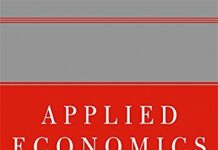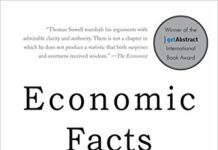
Ebook Info
- Published: 2007
- Number of pages: 640 pages
- Format: PDF
- File Size: 3.27 MB
- Authors: Thomas Sowell
Description
Basic Economics is a citizen’s guide to economics-for those who want to understand how the economy works but have no interest in jargon or equations. Sowell reveals the general principles behind any kind of economy-capitalist, socialist, feudal, and so on. In readable language, he shows how to critique economic policies in terms of the incentives they create, rather than the goals they proclaim. With clear explanations of the entire field, from rent control and the rise and fall of businesses to the international balance of payments, this is the first book for anyone who wishes to understand how the economy functions.
User’s Reviews
Editorial Reviews: About the Author Thomas Sowell has taught economics at a number of colleges and universities, including Cornell, University of California Los Angeles, and Amherst. He has published both scholarly and popular articles and books on economics, and is currently a scholar in residence at the Hoover Institution, Stanford University.
Reviews from Amazon users which were colected at the time this book was published on the website:
⭐—————–Incentives Matter—————–The first and most important lesson in economics is this: incentives matter. What is an incentive? It is something that people want, and that usually means money. Making money is an incentive. The nice thing about free markets is that the incentives lead to efficient outcomes. That’s what Adam Smith meant when he talked about the invisible hand. Markets are more than self-regulating. They are self-regulating and lead to outcomes that are good for everyone.A good way to appreciate the invisible hand is to look at what goes wrong when the government interferes in markets. The classic case is rent control. That’s when the government passes a law making it illegal for landlords to raise the price of rent. Normally when a bunch of people move to a city there is a temporary squeeze on housing. The demand goes up so the price goes up too. That’s where the wisdom of “incentives matter” comes into the picture. High prices mean high profits. Entrepreneurs who build new apartments will get a chance to cash in on some of those windfall profits. High prices lead to an increase in the supply of apartments. The supply goes up and the price goes back down.What happens with rent control? Since it is illegal to raise prices there is no incentive (there’s that word again) for entrepreneurs to build new apartments. The supply can’t go up to meet the demand. In fact the supply may go down because landlords may take existing rental units off the market because they are unprofitable. Now let’s consider the demand side of the equation. Rent control perversely makes the demand go up. With high prices consumers have to economize. Rent a studio instead of a one-bedroom. Empty nesters may move into a smaller apartment. Other people will get a roommate. This does not happen because the price is kept artificially low. Supply down, demand up. The housing squeeze happened because supply was higher than demand, and rent control made the root cause of the problem even worse. The outcome is shortages. There aren’t enough apartments to go around. One consequence of rent control is increased homelessness.Rent control also leads to discrimination. Progressives believe that the government can be an effective check on the power of the wealthy, but it often amplifies their power. Since there are more renters than apartments, landlords can take their pick. A racist landlord can afford to turn down black applicants and only rent to whites. Without rent control laws the supply and demand would be in balance. A racist landlord who turns down a qualified black applicant might have to wait a month or two before a qualified white applicant comes along. Not many racists are willing to lose a couple thousand dollars in rent to indulge their racism. Now, these days there aren’t many racist landlords but all landlords would prefer to rent to the wealthy than to the poor and working class. Studies on rent control show that these apartments are usually captured by upper-middle class professionals. The poor are driven into the “shadow market”. It includes the black market (people who rent out rooms under the table) and other apartments granted an exemption from rent control. The downside is that prices in the shadow market are higher. Thus rent control creates an “insider/outsider” dynamic in which wealthy insiders pay lower prices for rent and the poor pay higher prices.——————–Limits of Incentives——————–Sowell explains this kind of thing very well. I don’t think there is anything in his book that is actually wrong. Where I disagree with Sowell is the things that he leaves out. The First Fundamental Theorem of Welfare Economics is a mathematical proof that free markets will reach the most efficient outcome possible. It is often taken as a proof of the invisible hand, but it has some assumptions that are not generally true in the real world. In light of this, many progressives take the theorem as proof that government interference is widely needed to keep the economy on track! These assumptions are (1) perfect competition, (2) no free riders, and (3) people are rational. The short answer is that imperfect competition is not a real problem. Experimental economics teaches us that in the real world markets reach efficient outcomes under a much wider variety of conditions than you would expect from the First Fundamental Theorem. An oligopoly of just four firms will generally lead to an efficient outcome and even a two-firm duopoly has a surprisingly little amount of market power. See the nice entry on experimental economics in the
⭐for more detail. Sowell does a good job of explaining this. He points out that even if a single firm dominates the market, the threat of rival firm with a small market share will keep them honest.Sowell does not do a good job with the free rider problem, and it is a much bigger deal. Whenever groups of people have to work together it is possible for some people to shirk on the job or otherwise cheat or exploit the group. If you already know some economics then you will be tempted to object, “that’s why we have private property.” You can’t free rider when it is your own property at stake. That works in some cases but cooperation is still necessary. The two biggies are firms and governments. Firms can only work when people cooperate together for the greater good. If people are honest and work hard the firm will prosper. If people are corrupt, steal from their employer, or shirk on the job the firm will go under. This, in a nutshell, is one of the biggest reasons why the third world is poor. When people’s sense of allegiance doesn’t extend past their tribe or family then they won’t work hard or be honest when they deal with strangers. An internalized work ethic is essential to modern capitalism. Now, some people may object, “that’s why we have managers. It is there job to monitor the workers.” But that falls to the problem of “who will monitor the monitors?” Mangers have even more power than individual workers and their job performance is not as easily measured. So managers have both the means and opportunity to shirk. Monitoring helps, but it is not a silver bullet. The only time it truly succeeds is with a small business. The owner works as the manager and monitors the workers. The owner has an incentive (there’s that word again) to do a good job because the harder his employees work the higher his profits. (Note that this means being a good manager, not a ruthless manager). There is a great review of the literature in
⭐. Governments are just like really big firms with a lot more power and a lot less competition. Take all the problems we see with firms and amplify them and now you see the problem with government. So its not as simple as “let’s put the government in charge.” But still, free market incentives do not lead to efficient outcomes. A work ethic does.The next assumption is that people are rational. Economists have created a mathematical model of rational decision making. This leads to the notorious Homo economicus. The modern discipline of behavioral economics teaches us that real people do not behave like Homo economicus. In some cases this is actually a good thing. People have a sense of fair play and will punish free riders even at a cost to themselves. This minimizes the free rider on an informal peer-to-peer level. (See my review of
⭐for another example based on the hawk-dove game. It leads to the basis of property rights). In other cases people simply make self-destructive choices. Hyperbolic discounting is the classic case. This means that people can’t defer gratification. They are playful grasshoppers instead of hard working ants and pay the price once the winter comes. This is a case where the pursuit of self-interest leads to clearly bad outcomes because people cannot stick to healthy decisions. For most of us that means falling off our diet or skipping the gym, but for others it means drug addiction.—————Further Reading—————Little of this is in Sowell’s book. The upshot is that the world is more complicated than neoclassical economics makes it out to be. Nevertheless, I still recommend this book with qualifications. But if you are serious about learning some real economics you will need to deeper. I recommend the following syllabus:1. Basic Economics2.
⭐. Learn about what markets do really well, and about the free rider problem.3.
⭐. As the name implies, this is a left-leaning book. But the economics is well-done. The only thing I disagree with is his analysis of how adverse selection trumps personal responsibility as a blanket justification for the welfare state. For example, Heath cites Robert Moffit’s 1992 research showing that welfare does not cause extra out-of-wedlock childbirths. But subsequent scholars disagreed and Moffitt himself changed his opinion when he revisited the topic in 1998. See
⭐4
⭐Ok, I’ll admit it. My review has been critical of libertarian economics. That does not mean that you can’t be a libertarian, it just means you have to be more sophisticated. The Nobel Prize winning economist Vernon Smith invented experimental economics and has fully digested (or created) these modern developments in economics and makes a libertarian case that Hayek would love. The only downside is that this book has a ponderous and scholarly writing style. But you’ll need it if you want your economics to be (A) sophisticated and (B) strongly free market oriented.5.
⭐by Bruce Wydick. This is probably my favorite book on economics. It covers many cutting-edge topics and makes game theory accessible. Wydick is a Christian and he gets into social capital as well as spiritual capital.
⭐I have always enjoyed reading Thomas Sowell. He has the ability to make the difficult seem easy. Of course, as he points out in Basic Economics, the concepts may seem easy, but they are being misapplied all around us. How hard is it to understand that high prices attract resources? Yet, many states have laws against selling anything at a higher price during an emergency. They don’t want people price gouged. But wait a minute, if the prices went up the higher prices would attract resources to the area where such resources were most needed. Instead, few resources are attracted to the emergency because of the pricing laws and the folks needlessly suffer.The more the government tries to rationalize the economy, the worse it makes the economy. What they think ought to happen seldom happens. Thomas Sowell gives the best arguments for a hands off the economy approach to government. I think he is correct. Let the market make the decisions. It has worked since 1776, but somehow that isn’t good enough for a lot of people. People always think they are smarter than the market, or the market is somehow evil. But people are not smarter than the market, they do not have more knowledge, and the market is not evil or unfair. Only people and governments can be evil or unfair. A free market is neither.In my book The Super Summary of World History (Revised) I argue that Marxism and socialism think that free market results are evil because some prosper greatly and others suffer. Marx argues from a position of economic determinism that once capitalism is dead a wonderful new world will replace it. Capitalism caused evil because, Marx thought, everything flows from the economic system – literally. If the economic system changed so would the people. Thus, Marxism would change human nature, and with Marx’s new economic system man would become a new person that would be free from capitalist’s greed and fear. I say human nature does not change its basics and Marx was a dreamer. I believe Sowell would agree.Socialism does not go as far as Marx; however, I think socialism still relies on the death of capitalism to build a new world. Once the evil of capitalism is gone a new world will bloom because people will have more equality. Socialism aims at achieving equality by equalizing results. Not equalizing effort mind you, just results. The theory is that society exists before the person is born and every person is born into society which has schools, roads, businesses, money supplies and whatnot which all contribute to a person’s success or failure; thus, ever failure is a failure of the group, and every success is a success of the group. Anyone who fails must be brought up to the group average as his failure is the failure of all and the responsibility of all. Also, one’s success is the success of all; thus, the successful person owes society a large amount of his money and property to bring him down to the average of all the rest. I think this is both unfair and unwise. The failure or success of one is not the failure or success of all, and equality does not stem from demanding equal results no matter what the effort or insight.Basic Economics makes hash out of the Marxist and socialist theories. Knowledge is not something given out by society in neat little schoolbook packages. The knowledge is there for all to acquire most times, but key insights are not. Only by giving those with insight great rewards can we advance as a nation and a world. If the rewards are the same for everyone why take any risks? The risk takers often fail, and in fact they fail more often than they succeed. Only great rewards can justify taking great risks. Also, if all are rewarded the same, then how can we tell if one idea is better than another? Only the flow of money tells us what is a really good idea vs a poor one. To change successfully takes risks and insight, and to measure whether the change is good or bad takes an empirical way to measure the value of a product or service. The flow of money is that empirical measurement of value. This all flows easily from T. Sowell’s insights.I love the book.AD2
⭐Thomas Sowell is a profound economist and writer.
⭐Economic principles were well defined and backed up with multiple examples which made the majority of the principles easy to understand. Sowell effectively often quotes soviet economists to show why socialist/communist economies were riddled with issues and prone to failures.
⭐If you never had any previous exposure to economics principles and you wish to know more about the subject, then this is the right book for you. In my opinion, it is really a masterpiece on the basics of economics, where the few underlying principles are explained and supported by plenty of facts and data. A must read.
⭐Dr. Sowell’s books are always a delight to read. He distills the concepts down to layman’s terms and everyday examples that demonstrate economics in real life. This book is great for anyone wanting to educate themselves on economics, which should be everyone, really. What you learn in this book will help you manage your day-to-day and long-term finances, make informed decisions as well as cut through political and mainstream media rhetoric. THE definitive economics text.
Keywords
Free Download Basic Economics: A Common Sense Guide to the Economy in PDF format
Basic Economics: A Common Sense Guide to the Economy PDF Free Download
Download Basic Economics: A Common Sense Guide to the Economy 2007 PDF Free
Basic Economics: A Common Sense Guide to the Economy 2007 PDF Free Download
Download Basic Economics: A Common Sense Guide to the Economy PDF
Free Download Ebook Basic Economics: A Common Sense Guide to the Economy



